13.09.2004
Vadim FAIBISOVICH. A HUNDRED YEARS PASSED.
The 17th of January 1904 is a birthday of the St.Petersburg Chess Assembly, possibly the most successful organization in the history of Russian chess.
But the Assembly didn’t exist for a long time. It worked in name only for 15 years, but in point of fact – only till the beginning of the Great War.
Many things were done. There were two large international competitions: the congress in the memory of M.I.Chigorin in 1909 and the tournament in 1914; All-Russian tournament of masters in 1913/14, All-Russian tournaments of amateurs in 1909, 1911, 1913. Not very large tournament with participation of O.Duras in 1913 and six demonstrative games of Capablanca with chief masters at the end of the same year should also be mentioned. The initiative of Moscow citizens in arranging unofficial matches between combined teams of two capitals was taken with enthusiasm. Matches in 1911 and 1912 gave birth to the tradition that is surviving until now. An inner city calendar of competitions was arranged. Every year (and sometimes more often) tournaments of the first category were held, in 1910 such a competition took place for the first time in a rank of championship of St.Petersburg. Certainly, tournaments of other categories were also held, “mixed” tournaments, simultaneous displays, different team matches. In spite of its limited budget, the Assembly now and then had the opportunity to send its representatives to foreign tournaments. For the first time association of chess players assumed the publishing function; they managed to issue a number of works of E.A.Znosko-Borovskoi and two tournament collections, among them was “International chess congress in memory of M.I.Chigorin” which was republished 70 years later. A special attention should be paid to the fact that in the building of the Assembly there was the most numerous chess library in the country. And finally the peak of the assembly activity was the establishment of the All-Russian Chess Union.
All that is the result of work of people, to remember whom induces not only good round figure, but also sometoday’s problems.
The founders of the Assembly were very young chess amateurs who were close-knit by friendship and, what is very important, they were not that much interested in their own playing career. Their names say little to modern chess players.
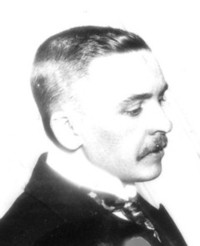
Elder brother of the famous chess master and literary man Sergei Aleksandrovich Znosko-Borovsky (1879-1911) after the finishing of the Law Faculty of the St.Petersburg State University worked as an official in the Academic committee of the Ministry of Education and at the same time taught in the Larin grammar school and in the grammar school № 10. He is the author of a number of articles on criminal law and jurisprudence textbook, which was several times republished, chairman of the board of directors of the Assembly in 1909-1910.
B.E.Maliutin dedicated a large article to the memory of his untimely deceased friend, the extracts from this article may provide insight into both the personality of S.A.Znosko-Borovsky and the principles of the Assembly activities:
“…S.A. was the most mature among the members of the small circle of young people who were close-knit by familiarity and school relations, who went in for chess at the end of the 90s; being keen on chess as much as others he soon saw a broader aim before him. He wanted to use the young energy of the circle for a firm setting up of chess playing in St.Petersburg… The new association started to live quiet and modest, being at enmity with nobody and paying its attention to the matters of internal structure; only after getting confidence in its solidity, it decided to extend its tasks. At first it didn’t have a numerous staff, but little by little it united all Petersburg chess players: old chess players of the Chigorin time, the circle of founders and adjoining to it people and numerous new generations of chess amateurs from studying youth. Large competitions of the Assembly placed it face-to-face with all chess Russia and the publishing activity strengthened and extended this connection…
For its influential position and large scale the Assembly was indebted to indefatigable energy of P.P.Saburov, while its solidity, efficiency, faultlessness that gained general confidence is the merit of S.A. Taking care of them, he didn’t ignore any work: treasurer’s duties, composition and remaking of regulations and tournament rules, troubles with searching of accommodation, business correspondence, contacts with different people and organizations, realization of any broad intention into living, clearly designed program – here is a quite incomplete list of affairs of S.A., in each of them he put his sober thoughts and strong will that were guided by deep devotion to his work. He restrained his companions in the board of directors, when they were carried away, and he encouraged them in a moment of despondency reminding them that “noblesse oblige” and they mustn’t give up their work on midway…
It’s a duty of his friends, companions, admirers to eternalize the noble devotion of S.A.Znosko-Borovsky to chess. The Assembly, the members of which valued S.A. as a man of all-around erudition, serious and attractive man, has already taken steps in this direction. But the broad masses of Russian chess players should also remember him, having associated their noble remembrance with clear recognition of the impelling necessity in enlightened and energetic men”.
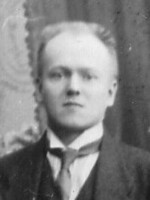
The nephew of A.A.Saburov, who was a conspicuous statesman of the epoch of the emperor Alexander II and the son of P.A.Saburov, the story about whom is to be come below, Petr Petrovich Saburov (1880-1932) after finishing of Aleksandrovsky Lyceum he served for a short period in the Ministry of Foreign Affairs. In the reference book “All St.Petersburg in 1909” one can read: “retired assessor, the chairman of the board of SPB chess assembly ". Thus, P.P.Saburov can be considered as one of the first Russian professional managers in chess sphere. He was a chairman of board during the period of 1908-1909 and 1911-12, and was elected the chairman of the All-Russia chess union in the spring 1914.
It happened so that his last Petersburg address (Liteiny avenue. 46/18) became the fifth and the last address of the Assembly. By the interesting coincidence, within a few steps from this place, on Liteiny 42, fifteen years later was opened the first in the USSR central chess club. In the book «Chess life in the Soviet Russia» A.A.Alehin wrote:
«During 1918 Petrograd chess players quite often gathered on an apartment of chess enthusiast P.P.Saburova, however this last opportunity was lost after his departure abroad... "
And in May 1932 issue of" Deutsche schachzeitung " there are such lines:
«In Caruge, near Geneve, in the beginning of March P.P.Saburov has died. Before the war he played an outstanding role in Russian chess life, he was the supporter of the idea of creation of the international chess federation that was fulfilled later. P.P.Saburov was the person of noble character, extraordinary kind and refined, besides, he was very fond of playing music. Owing to Russian revolution he was separated from the native land, and he modestly lived in Switzerland, being very interested in the events of the chess world till his last days".
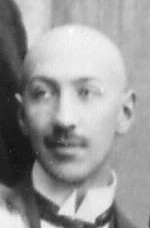
The Son of general - major,Boris Evgen'evich Maljutin (1883-1920),as well as P.P.Saburov, finished Alexandrovskylyceum. He worked in different state departments, but longer than in any other department he worked in the office of the State Duma. In 1917 had a rank of the collegiate adviser (an equivalent of the lieutenant colonel).
Unlike his colleagues in the management of the Assembly, B.E.Maljutin played chess rather good. For example, in the All-Russia tournament of amateurs of 1909 he shared 4-6 places. For several years he was editing a popular chess section in the newspaper "Rech". [It was there that V.I.Lenin has seen a famous etude of brothers Platov. This episode from life of the state leader invigorated Soviet chess workers.] B.E.Maljutin organized the first in a history of chess mass (more than 150 participants) competitions: a match on correspondence the North - the South, 1911-12. He became a chairman of board in January, 1913. As he was among the participants of the congress in Mannheim (July, 1914), he was interned and was allowed to return to Russia only in August, 1916. A rebel against his fate, he tried to somehow arrange the chess life. In 1917 and, what is absolutely surprising, in 1918 the Assembly held tournaments of the first rank. But they did not confine to the tournaments. Here are some extracts from the newspaper "Evening star ", which had been published till August, 1918.
March, 30, 1918, page 3. «On Saturday, March, 30 B.E.Maljutin will give a simultaneous display not looking at a chess board against 12-15 persons in Petrograd chess assembly (Nevsky prospect 72, in the yard to the right). The beginning is at 4 o'clock in the afternoon ".
April, 23, page 3. «On April, 28 in Petrograd chess assembly (Nevsky prospect 72, in the yard to the right, 4th floor) is held a simultaneous display not looking at a chess board against 12-15 persons by B.E.Maljutin. The beginning is at 1 o'clock in the afternoon ".
April, 29, page 4"B.E.Maljutin simultaneous display a l'aveugle that took place on Sunday in Petrograd chess assembly was rather animated and attracted a lot of public. 13 amateurs who were stronger than the team of the previous display were taking part. As a result, B.E.Maljutin had won six games, had drawn three ones and had lost four(to Galbershtadt, Meier, von Visin and Dmitriev) ".
June, 20, page 4. "The Petrograd chess assembly, in view of requisition of the occupied apartment was enforced to move to a private apartment for the time being (Liteiny prospect, 46/18, in the yard. Games take place daily, except Mondays; on weekdays from 6 p.m. till 11 p.m., on Sundays from 1 till 6 p.m. Visitors are admitted according to the former rules ".
July, 3, page 2."On July, 5 in Petrograd chess assembly (Liteiny prospect 46/18) A.A.Alekhin simultaneous display not looking at a chess board against 12 players is held. The beginning is at 6 p.m. Preliminary registration of the participants is held in the assembly in the days of game: on weekdays (except Monday) from 6 p.m., on Sunday from 2 p.m.".
[Yet it was not possible to find out, whether A.Alekhin simultaneous display was held or not, but hitherto unknown fact of his arrival to Petrograd in the summer of 1918 makes us again refer to the biography of the fourth world champion.]
A.F. Iljin-Genevsky, who had played a large role in a history of the Soviet chess, speaks highly of B.E.Maljutin in his excellent book "The Notes of the Soviet master» (Leningrad, 1929). However the atmosphere in the country was changing quickly, and the same author in the brochure " International chess movement and Soviet chess organization" (1931) writes: " In 1918 the Chairman of the chess assembly fled to Don and became the editor of the main cadet party newspaper " Rech", the articles of which were inspiring white armies to struggle against the Soviet Russia ". In spite of these severe words, B.E.Maljutin is the only person of those mentioned in my article who was honoured with personal curriculum vitae in the encyclopedic dictionary "Chess" (1990).
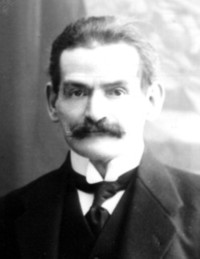
In 1906 collective of heads of Assembly was replenished with Juliy Osipovich Sosnitsky (1878-1919) a secondhand bookseller by profession. In already quoted book "Chess life in Soviet Russia" A.A.Alekhin wrote many kind words about him:
"... In the person of Sosnitsky Russian chess family has lost the keyman... The Person of rare energy and almost inexhaustible desire to work, one of the best experts on the world chess literature, the passionate chess enthusiast responding with touching kindness and enthusiastic geniality to all significant events of the country’s chess life, during long years of his work as a librarian, and later as a vice-chairman of the assembly, he was one of " three pillars " (together with Maljutin and Saburov Jr.),who were the mainstay of the organization... After October revolution J.O.Sosnitsky managed to save a valuable chess library of the assembly, having brought it to his apartment. However his hopes for better days were not destined to be realized: in February, 1919 he fell a victim to typhus epidemic raging all over Soviet Russia... After his death Bolshevist authorities declared not only his own library, but also taken by him into custody library of the assembly to be “nationalized”! Despite all the efforts both his and of his family and his chess friends it was impossible to find out on which private market, and, the main thing, to whom was this " nationalized " property... sold "
It is important to note, that in 1912 J.O.Sosnitsky has replaced A.A.Alekhin as the editor of a chess section of the newspaper "New time". His publications on chess themes can also be found in "Evening times" and "Evening star".
Heads of Assembly in full measure had the major quality of the professional manager: a skill to involve in cooperation those who can be of use. Besides masters E.A.Znosko-Borovsky, G.J.Levenfish, S.N.Frejman in different years in board were elected authoritative persons from the various spheres: a specialist in plant breeding and state counselor A.I.Bazarov; a railway engineer P.N.Dumitrashko, who in 1909 became a member of the ministry; L.A.Velihov an expert in the field of the municipal economy, who a short time later became a deputy of the State Duma. However special attention deserve three more people.
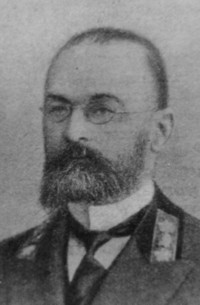
Boris Zaharovich Kolenko (1856-1946),a geologist and a teacher. Having finished in 1875 with a gold medal a grammar school, he entered St.-Petersburg University. After a successful graduation he was kept in the department of geology, and then for about two years he articled with the Strasbourg University. He upheld a thesis for master degree on mineralogy and geodesy. He suddenly gave up science and stepped into a path of national education in which he succeeded. Having worked for two decades in the south (Catherinodar, Pyatigorsk, Kutaisi) he came back to St. Petersburg in 1902, having obtained a post of the director of a grammar school №3 and a rank the State counselor. Being very fond of chess he could take the liberty of playing chess only by correspondence since he was very busy at work. In 1904-1907 he was elected the chairman of board of the Assembly. In 1908 at the urgent request of the authorities he had to leave the capital as he was convicted of discrediting contacts with antigovernmental forces. Perhaps, this helped him in Soviet times. In the twentieth B.Z.Kolenko's lived in Moscow where he was teaching in the academy of Mines.
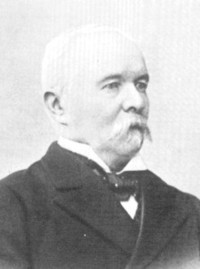
Peter Aleksandrovich Saburov (03.04.1835-10.04.1918),the honourable chairman of the St.-Petersburg chess assembly and the All-Russia chess union. In1854 he finished Alexandrovskylyceum with the big gold medal. Since 1856 he worked in the Ministry of Foreign Affairs: in the sixties he was the adviser of embassy in London, since 1870 he worked as the ambassador in Athens, in 1879-1884 he was the ambassador in Berlin. He played an important role in prevention of a brewing conflict between Russia and Germany. [Alexander the third allowed to publish only 30 copies of his book "Ma mission au Berlin ", which were distributedonly by the personal instruction of the emperor.] In 1884 he became a senator, in 1900 - a member of the State Council where was engaged in the questions of economics and finances. He collected a quantity of ancient frescos and mosaics and willed them to the Hermitage museum. Man and boy he was fond of chess and has managed to impart this passion to his son.
In the newspaper "Our century", 11.04.1918, it was written:
" Down to his death P.A.Saburov did not cease to be interested in the future of Russian state economy and studied finances of the French revolution to find the experience for our sad present days about which he was very much worried. In general P.A.Saburov, who was brought up in traditions of the sixties, he was a type of a generation that has almost disappeared, the generation of the enlightened officers of State, who, sincerely adhering to the moderate - liberal political beliefs, were working without adjusting to different passing trends ".
It is necessary to add, that a book "Memoirs of Saburovor Bismarck and Russia" was published in 1929 in Cambridge.
Why in the Soviet chess literature P.A.Saburov's portrait is drawn in negative shade? The history of this question is rather interesting, but it is outside the frameworks of the anniversary theme, the article concerning it will be placed on site "е3е5".
A long-awaited meeting on which the All-Russia chess union was established took place in April 1914 in the office of the Assembly on Liteiny prospect, 10. A very respected man, a chess amateur was entrusted to preside over this meeting.
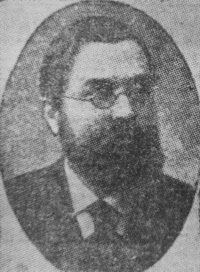
Nikolay Nikolaevich Kutler (1859-1924),an outstanding Russian financier, after graduation from Moscow University in 1884, he had risen from a provincial tax inspector up to a minister in S.J.Vitte's cabinet in 1905. In September, 1909 he effectively won a by-election in the St. Petersburg State Duma. In 1919 he became an adviser of people’s committee of finances, since 1922 he became a member of board and the head of the issuing department of the State Bank of the USSR. It is possible to judge about the scale of N.N.Kutler’s personality by newspaper comments on his sudden death on 10.05.1924.
"The Financial newspaper ": "High carat currency about which so much is written and said both in our country and abroad, owes much to N.N.Kutler... Extraordinary frankness and sincerity, great intelligence, rare truthfulness, disinterestedness and thoughtfulness, the ability to solve serious problems directly, without sophisticated reasonings were typical of this great, clever and excellent person ".
"The Evening Red newspaper ":"... It would be desirable to note a high moral authority which he had both in the opinion of his colleagues and all the people who contacted with him, and his outstanding role in the arranging of circulation of money ".
Even more certain estimation was the Paris emigrant newspaper "Latest news":"It is hardly an exaggeration to say, that it was he who saved Russia from the eventual financial dislocation".
It is not surprisingly that since October, 1917 N.N.Kutler was arrested time and again. For the last time he was arrested in autumn of 1921. In the common prison cell of the special department; he was the oldest, but he was notable for his calmness and courage. And, under the attestation of the eyewitness he "very much welcomed an idea to make chess of bread "...
In addition to the birth of All-Russia chess union, large international tournament and All-Russia tournament of chess masters, 1914 is memorable for the celebrating of the 10th anniversary of the Assembly. Celebrations took place in the same house, Liteiny10. [The Assembly moved there in September, 1913, before, its office was on Nevsky prospect: for the first three years at number 44, then at number 55. In November, 1917 when a Red Army group was accommodated on Liteiny 10, chess players again had found a shelter on Nevsky prospect, this time at number 72.] Many laudatory words were said at anniversary meeting and the subsequent banquet. Not to require services of the interpreter, the employee of the Cuban consulate H.R.Kapablanka greeted everybody in English. With excessive pathos spoke L.A.Velihov:
"We were chummed up by game which has no equal,
the martial science and eternal art... "
P.P.Potemkin's toast was more graceful:
"There is no muse of chess among the famous muses
, there is no sky-born lady, an alliance with whom is dearer to us than scales to Mozart.
Well, if there is no muse, we’ll find our pleasure and indulgence among goddesses... "
The barrister A.V. Bobrishev-Pushkin was frequently quoted by press:
"While the majority worships the golden calf, this absolutely unselfish cause united people of different age, ranks, nationalities, political opinions. And these disinterested relations are the keystone of prosperity of the chess assembly ".
Information about L.A.Velihov and P.P.Potemkin you can find in a magazine "Chess St. Petersburg" № 4, 2002, about A.V. Bobrishev-Pushkin in the book which was published a year ago" Lubjansky gambit ". [The only one clarification: The author of the book S.Grodzensky writes: "It is not known where a descendant of an ancient family, a lawyer and a chess player, Bobrishev-Pushkin ended his days ". Since 1996 when the second volume of "Leningrad martyrology", was published, everything is known. He was shot on27.10.1937 in forestland Sandormokh, or "Karelian Catyn" as it is called now.]
... The anniversary evening was finished by reading of the congratulatory telegrams sent from different cities of Russian empire.
Later the phenomenon of the Assembly became more clear. It cannot be separated from time and place. St. Petersburg those years was a city of great many of various charitable, educational, cultural, scientific, creative, political and other associations and of unbelievable number of outstanding people. The chess assembly was an organic particle of this unique atmosphere...
In the beginning of the current year the president of St. Petersburg chess federation S.G.Serdjukov planned to celebrate the centenary "adequately". The attempt has failed.
